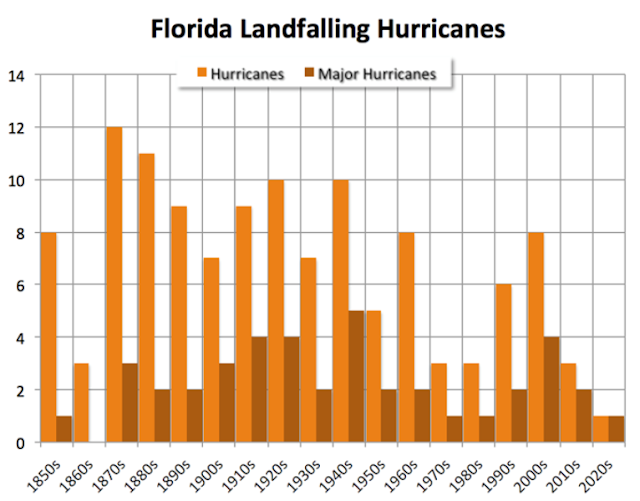The Washington Post on 30 September 2022, claimed that "climate change is fueling the creation of super hurricanes." The article says that "as waters warm, 7 super storms have lashed the U.S. since 2017."
The article argues that ocean water is warming, apparently due to global warming, not either warming or cooling climate change. It argues that hurricanes draw their energy from warm water and therefore become stronger and more frequent. Yes, hurricanes do draw their energy from warm water, but they also require wind shear to form as hurricanes. Since global warming does not much affect the temperature of oceans in tropical regions due to the moderating effects of the water cycle, while it does increase temperatures in the mid-latitudes, the wind shear cause of hurricanes is actually reduced. So what is the historic data on hurricanes? Let us look at the record for hurricanes that had landfalls on Florida:
Maybe you can see the catastrophic increase if the data is plotted as curves rather than as bars?
I must confess that the frequency of major landfalling hurricanes does not appear to have increased, unless you only look at the timeline beginning about 1980. It seems undeniable that the frequency of all hurricanes since the 1870s has decreased. But, perhaps the focus on Florida is the problem. Let us look at the data for hurricanes landing anywhere on the U.S.
Do you see a dramatic increase in hurricanes or in major hurricanes in this data? Once again, it seems clear that the total hurricane frequency is actually decreasing. The major hurricanes do not seem to be changing much at all.
Almost anyone at all serious about climate issues agrees that a five-year span of time is still just weather, while it takes a minimum of 30 years to be considered climate. Note that the Washington Post article was claiming that a 5-year span of hurricane history was proof of man-made global warming, which they ridiculously call climate change. Actually, 30 years is just enough to cover the shortest of the climate cycles, so any real climate argument ought to cover a period of quite a few 30-year cycles.
Let us examine the historic data on ocean surface temperatures, since the Washington Post argument says hurricane strength and frequency are just a function of ocean surface temperatures.
According to this data, the ocean temperatures have increased. They did not change much from 1850 to about 1900. There was a decrease in temperatures from 1900 to 1910, then an increase in temperature from then until the mid-1940s, then was nearly constant from then until the late 1970s, with another increase from then until about 2010. Based on the Washington Post's claim that warmer water fuels hurricanes, the increase in water temperature from 1910 to the mid-1940s should have caused a significant increase in hurricanes. Do you see that in the landfall hurricane charts above? If the effect is there, it sure is small. Then again, where is the major increase in landfalling hurricanes from the late 1970s through 2010 compared to earlier periods?
If mankind's use of carbon-based fuels is the cause of warming oceans, what huge increase in fossil fuels caused the warming from 1910 to the mid-1940s? Europe was not producing very much for several years following WWI and then no one was during the 1930s. Most of the world's population was not much more industrial than it had been in the 1800s. So, how did this rapid ocean warming occur during this period? I cannot see a good argument for it being due to man's use of carbon-based fuels.
Let us look at the concentration of CO2 in the atmosphere since 1958 and see if we can see a correlation between the CO2 concentration and the ocean surface temperatures.
The catastrophic man-made global warming argument is that carbon dioxide is the thermostat for the Earth's temperature, presumably including the 71% of the Earth's surface covered by water. Any claim that CO2 in the atmosphere causes an increase in the temperature has to acknowledge that the warming effect requires more and more carbon dioxide for a given temperature increase. The actual increase in CO2 in this record is a bit faster than linear, but it is not exponential or at all close to it. So, all ocean temperature increases ought to be gradual and constant (or even dropping off) from 1958 to the present. Yet for much of this time, there was no increase in ocean water temperature. Then in the late 1970s the temperature takes off a bit in the ocean temperature record, but where was the acceleration in CO2 concentration in the atmosphere?
One can only conclude that there is no scientific evidence that CO2 controls the temperature of the oceans and there is none that warming oceans are enough to cause an increase in the frequency and intensity of hurricanes. Therefore, there is no reason to claim that man's use of carbon-based fuels is causing an increase in the frequency and intensity of hurricanes.
It is very strange that so many people claim to be scientific experts who yet believe in this nonsense. It is also very strange that so many people who have no knowledge about such matters are nonetheless strong believers in the adamant claims of those who claim to know the science, without themselves believing they have any need to understand the science themselves.





































































